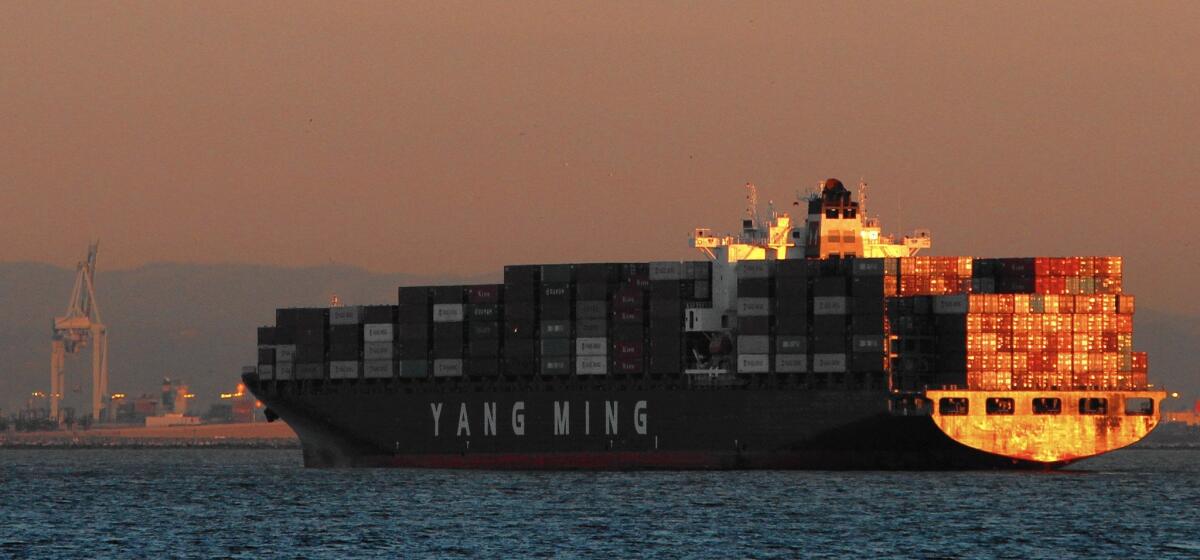Work at West Coast ports to scale back for 4 days

- Share via
West Coast ports — including the nation’s busiest in Los Angeles and Long Beach — will partially shut down for four days as shipping companies plan to dramatically slash dock work amid an increasingly contentious labor dispute.
Terminal operators and shipping lines said that they would stop the unloading of ships Thursday, Saturday, Sunday and Monday, because they don’t want to pay overtime to workers who, they allege, have deliberately slowed operations to the point of causing a massive bottleneck. Thursday is Lincoln’s Birthday and Monday is Presidents Day, which are holidays for the workers.
Slowing down work “amounts to a strike with pay, and we will reduce the extent to which we pay premium rates for such a strike,” said Wade Gates, spokesman for the Pacific Maritime Assn., the employer group representing the shipping companies. The local union in Los Angeles and Long Beach has denied using slowdown tactics.
The union has blamed the shipping companies for the congestion, which it says stems from increased use of larger container ships and a shortage of trailers to haul the cargo from the ports.
It’s unclear whether the partial shutdown foreshadows a total closure of the ports. Fears of a lockout of dockworkers, who have been without a contract since July, have risen in the last week and the two sides haven’t held talks since Friday.
International Longshore and Warehouse Union President Robert McEllrath said the employer group canceled talks Wednesday and accused the shipping companies of curtailing port work “to put economic pressure on our members.” The negotiations have dragged on for nine months.
But both sides said talks were scheduled to take place Thursday morning.
Congestion at the ports has delayed shipments from Asia and has hurt businesses that rely on parts and supplies from China and elsewhere. Some businesses are rerouting goods by air or through ports on the East Coast, but those work-arounds have been expensive. Los Angeles and Long Beach ports account for about 40% of the nation’s incoming container cargo. In 2013, the two ports handled roughly $400 billion worth of goods.
“The slowdowns need to end. The brinkmanship needs to stop,” said Jonathan Gold, vice president for Supply Chain at the National Retail Federation, which Wednesday called on President Obama to intervene. “This stalemate is hurting American businesses, their employees and consumers.”
The ports won’t shut completely Thursday and coming days, the employer group said. Workers will still move goods already on the docks onto trucks and rail cars. And on non-holiday weekdays moving forward, L.A. and Long Beach terminal operators will have the option to increase shifts for unloading cargo, the association said.
The four-day cutback is the latest in a series of work reductions.
Unloading of ships at night at the Los Angeles and Long Beach ports was stopped last month. The employer group said terminals were so overcrowded that they needed to focus on moving containers off the docks, without adding new cargo to the mix. Ship unloading was also temporary stopped last weekend.
The union, however, has said there is room for new containers and, as it did Wednesday, accused the employer group of cutting back port work to gain leverage in the contract talks.
Last week, employers said the already congested ports could soon become inoperable, leading them to shut operations and stop paying dockworkers. It urged the union to accept what it labeled an “all-in” contract offer with increases in wages and pensions.
Dockworkers are among the best paid blue-collar workers in the country, earning between $26 and $41 an hour, depending on experience and skill.
Union spokesman Craig Merrilees has said the two sides are very close to a deal, but has declined to say what is tying up the talks, citing a request from a federal mediator to not discuss the negotiations in public. But Merrilees has said that wages and benefits have not been sticking points in previous negotiations.
According to employers, a major hurdle is a union demand that both sides have the ability to unilaterally remove local arbitrators at the end of a labor contract. Those arbitrators — who can now only be fired by mutual consent — settle disputes on the docks when a contract is in place.
Employers say that if such a change is made, alleged union slowdown tactics would become constant, because the union could “fire judges who rule against them.”
The union said Wednesday that employers are “grossly” mischaracterizing its current bargaining position. “It seems to us that the employers are trying to sabotage negotiations,” union President McEllrath said.
Twitter: @khouriandrew
More to Read
Inside the business of entertainment
The Wide Shot brings you news, analysis and insights on everything from streaming wars to production — and what it all means for the future.
You may occasionally receive promotional content from the Los Angeles Times.











